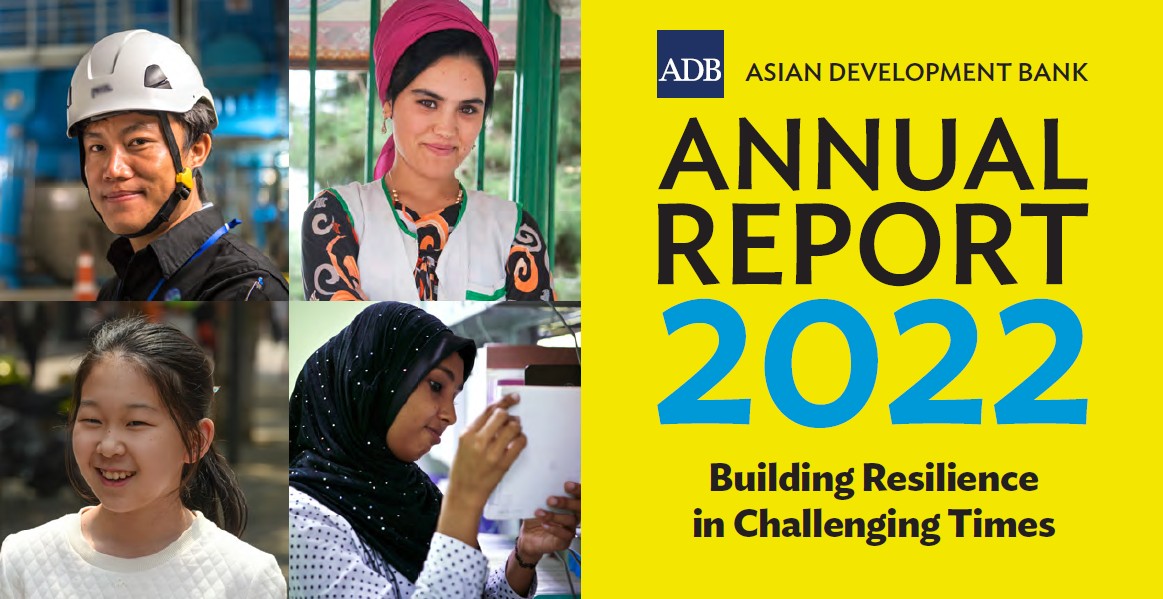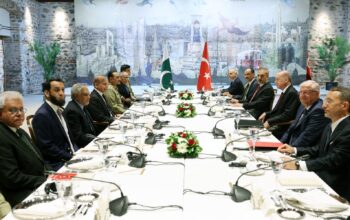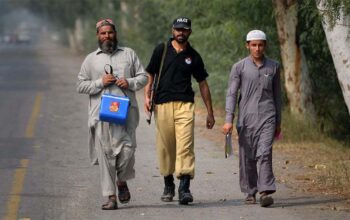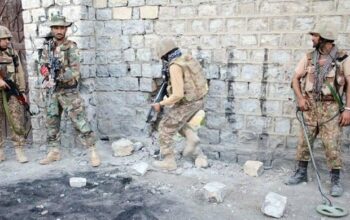Receiving commitments totalling to USD 5.58 billion, Pakistan accounted for just under a fifth of the ADB’s total loan and grant commitments over the year 2022.
By Ahmer Kureishi
ISLAMABAD: Pakistan received USD 5.58 billion of the USD 31.8 billion in loans disbursed by the Asian Development Bank (ADB) among all member states for various programs and projects during the year 2022, a new ADB report has said.
Published Monday, ADB’s Annual Report 2022 including financial and operational results shows that financing committed to Pakistan over year 2022 included USD 2.67 billion in concessional funding, while USD 1.439 billion came in regular ordinary capital resources.
The report acknowledge that Pakistan is among the countries severely impacted by rising food and energy prices, exacerbated by the Russian invasion of Ukraine, triggering domestic inflation and curtailing consumption. It notes that Pakistan was also hit by devastating floods that killed more than 1,730 people, directly affecting 33 million people, causing billions of dollars in damage, and worsening an already fragile economic situation.
The report includes a box item titled “Relief, Recovery, and Reconstruction in Pakistan” that highlights how the Pakistan floods that raged from June to October 2022 killed more than 1,730 people.
“By the time the floodwaters subsided, they had impacted 33 million people, inflicted damages and economic losses exceeding USD 30 billion, and resulted in recovery and reconstruction needs estimated at USD 16.3 billion”, says the box.
“ADB worked swiftly to provide immediate support for Pakistan’s flood victims, disbursing a USD 3 million grant under the Asia Pacific Disaster Response Fund in September and ensuring supply of emergency food supplies, tents, and other relief items.
“The bank followed that emergency support by committing a further USD 449 million for direct and comprehensive flood support.
“Comprising a loan, technical assistance, and repurposed financing, the package covers reconstruction of 485 kilometers of vital roads and around 30 bridges. It is also helping restore and upgrade irrigation and drainage structures and strengthen flood risk management.
“In October, ADB provided Pakistan with USD 1.5 billion, along with USD 500 million in cofinancing, through the Building Resilience with Active Countercyclical Expenditures Program. This support is helping the government counter rising food prices and strengthen food security, shore up employment, and enhance social protection for poor and vulnerable people, many of whom were directly affected by the floods.
In addition to its substantial emergency response for Pakistan during 2022, ADB’s support during the year included USD 2.1 billion through the bank’s Building Resilience with Active Countercyclical Expenditures (BRACE) programs.
“This helped Pakistan navigate the economic impacts of the Russian invasion of Ukraine and extreme flooding, and provided a buffer to shore up government budgets in the Kyrgyz Republic, Tajikistan, and Uzbekistan”, says the report.
The report says ADB signed a USD 300 million loan to further develop capital markets, promote private investment, and help mobilize domestic resources in Pakistan.
“The loan supports policy actions to strengthen market stability and attract investor capital, including structural reforms within the Securities and Exchange Commission of Pakistan”, it adds. “By making Pakistan’s capital markets more robust and strengthening government debt management, the program helps underpin the financing of sustainable growth.”
The bank also funded research on the constraints of Pakistan’s financial institutions to lend to women for green purposes, as ADB knowledge events explored the ways financial institutions are closing gender gaps in green finance.
The projects in Pakistan towards which these loans and grants were committed include Second Power Transmission Enhancement Investment Program—Tranche 4, Naulong Integrated Water Resources Development, Khyber Pakhtunkhwa Water Resources Development, Improving Workforce Readiness in Punjab Project, Third Capital Market Development Program (Subprogram 2), Khyber Pakhtunkhwa Health Systems Strengthening Program, Building Resilience with Active Countercyclical Expenditures Program, and Emergency Flood Assistance.
The ADB announced from its headquarters based in Manila that it committed USD 20.5 billion from its own resources in 2022 to help Asia and the Pacific continue its recovery from the COVID-19 pandemic despite fresh economic headwinds and crises.
The report summarizes how the bank combined finance and knowledge, and leveraged partnerships to help the region cope with economic shocks exacerbated by the Russian invasion of Ukraine, a worsening food crisis, and extreme weather events.
“Our support in 2022 helped our developing member countries (DMCs) navigate the immediate impacts of these crises while bolstering their longer-term resilience in critical areas such as climate change and food security,” said ADB President Masatsugu Asakawa.
The USD 20.5 billion comprised loans and guarantees, grants, equity investments, and technical assistance provided to governments and the private sector. ADB mobilized an additional USD 11.4 billion in cofinancing.
ADB committed USD 6.7 billion in financing for climate mitigation and adaptation in 2022, making progress toward its ambition of providing USD 100 billion in cumulative climate financing during 2019–2030.
To address the region’s worsening food crisis, ADB provided USD 3.7 billion under its USD 14 billion food security program, delivering essential food relief for people most in need and strengthening food production systems.
To support economic recovery, ADB financed institutional reforms, strengthened public service delivery, and growth in key economic sectors. ADB’s USD 3.9 billion in commitments to the private sector included vital liquidity support to enterprises facing a difficult business environment.
Meanwhile, the bank made wide-ranging investments in quality infrastructure as well as in education, health, and other social sectors that contributed to building economy-wide resilience.
Promoting gender equality remained at the forefront of ADB’s work, with 97% of the bank’s operations in 2022 contributing to this agenda. These operations included initiatives to improve women’s access to quality jobs, foster women’s entrepreneurship, and build women’s resilience to climate change.
Annual Report 2022 provides details on how ADB is evolving to better meet the changing and complex needs of its DMCs. These include measures to unlock greater resources to support the region’s development through an ongoing review of the bank’s capital adequacy framework, as well as structural and non-structural organisational reforms guided by a new operating model.
“I am confident that these reforms will ensure ADB delivers greater impact in the region, including by scaling up climate financing, mobilizing more private sector investment, and providing a wider range of development solutions in response to client needs,” said Mr. Asakawa.
ADB is committed to achieving a prosperous, inclusive, resilient, and sustainable Asia and the Pacific, while sustaining its efforts to eradicate extreme poverty. Established in 1966, it is owned by 68 members, 49 of which are from the Asia-Pacific region.
A member since the beginning, Pakistan holds a 2.174 percent share of the Bank’s subscribed capital and 2.033 percent of voting power on its board.
The full report may be read below.
Copyright © 2021 Independent Pakistan | All rights reserved




